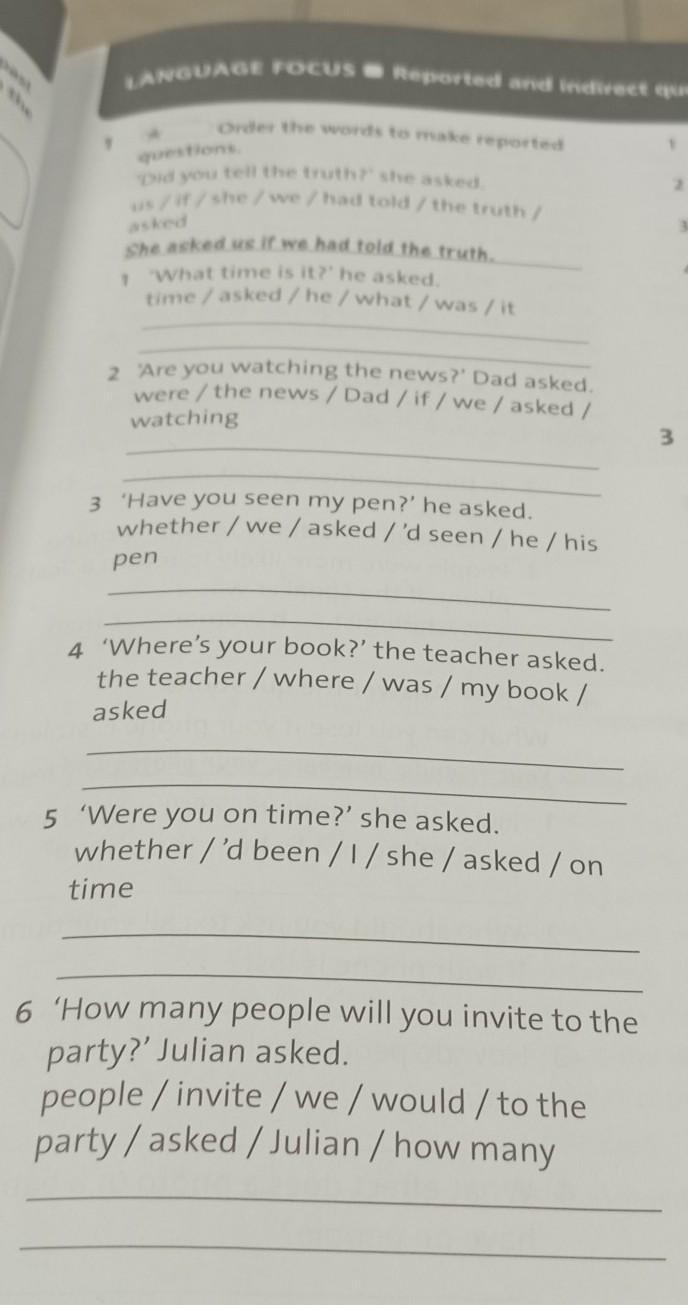1 LANGUAGE FOCUS Reported and indirect question Order the words to make reported questions. 'Did you tell the truth?" she asked. us/if/she/we/ had told / the truth / asked She asked us if we had told the truth. 1 'What time is it?' he asked. time / asked / he / what/was / it 2 'Are you watching the news?' Dad asked. were / the news / Dad/if/we/ asked / watching 3 'Have you seen my pen?' he asked. whether/we/ asked /'d seen/he/his pen 4 'Where's your book?' the teacher asked. the teacher / where / was / my book / asked 5 'Were you on time?' she asked. whether /'d been /1/she/ asked / on time 1 How He a 2 'Can The people/invite/we/would / to the party/ asked/Julian / how many 3 W Mu 4 'W 3 + C 6 'How many people will you invite to the party?' Julian asked.

Ответы
Ответ:
1 He asked me what time it was.
2 Dad asked us if we were watching the news.
3 He asked us whether we had seen his pen.
4 The teacher asked me where my book was.
5 She asked me whether I had been on time.
6 Julian asked us how many people we would invite to the party.
Объяснение:
1 Он спросил меня, который час.
2 Папа спросил нас, смотрим ли мы новости.
3 Он спросил нас, видели ли мы его ручку.
4 Учительница спросила меня, где моя книга.
5 Она спросила меня, пришел ли я вовремя.
6 Джулиан спросил нас, сколько человек мы пригласим на вечеринку.
Direct-indirect conversion
При переводе прямой речи в косвенную, временная форма сдвигается на шаг в прошлое, кроме следующих случаев:
1. Если слова автора в настоящем или будущем времени. He will say that he has been there before. Он скажет, что уже был здесь.
2. Действие в Past Perfect (Continuous) или в Future-in-the-Past.
3. Обстоятельства времени не изменились. He said that he bought it yesterday. Он сказал, что купил это вчера.
4. Утверждение всегда верно. The teacher said that water boils at 100 C. Учитель сказал, что вода кипит при ста градусах.
5. Утверждение верно длительный период времени или в текущем отрезке времени. She said that she loves you. Она сказала, что любит тебя.
6. Сообщение повторяется сразу же. He said that the food is delicious. Он сказал, что еда изыскана.
7. В условных предложениях 2 типа. He said that if he were you, he wouldn’t do that. Он сказал, что на твоём месте он не стал бы этого делать.
8. Желаемые события. She said she wished she were younger. Она пожалела о том, что она не моложе.
9. Глагол ought to. He said they ought to be careful. Он сказал, что им следует быть осторожней.
10. Глагол must в значении «должно быть». He said that they must be at home. Он сказал, что они должно быть дома.
11. Когда в прямой речи содержится указание на время события в прошлом. He asked me if I was unconscious a few days ago. Он спросил меня, терял ли я сознание на днях.
Для передачи общих вопросов используется if или whether. Вопросительные предложения передаются с прямым порядком слов: He asked me if/whether they were at home. С глаголом-связкой порядок может быть обратным: He asked me what was the price.
При сдвиге временной формы глагола в прошлое, в косвенной речи, по ситуации, изменяются обстоятельства места и времени, местоимения, а также, происходит отстранение от эмоций:
this – that, these – those, here – there, now - then (at that moment, at once, immediately), come – go, today – (on) that day, yesterday – the day before (earlier), tomorrow - (on) the next (following) day, last night – the previous night, last week – the week before, ago - before(earlier), next week – the next (following) week, now that – since, so – very, yes/no – answered in the positive/negative, he - that man, we - they.
Если из прямой речи лицо не известно, используется местоимение they, а в словах автора wanted to know, wondered:
He said: “Come here”. – He told them to come up to him.
He said: “Where are you going?” – He wanted to know/wondered where they were going.
Кроме слова said используются глаголы, выражающие характер прямой речи: agree + to-inf,
demand, offer, promise, refuse, threaten, claim, advise + sb + to-inf, allow, ask, beg, command, encourage, forbid, instruct, invite sb, order, permit, remind, urge, warn, want, accuse sb of + -ing form, apologise for, admit (to), complain to sb about, deny, insist on, suggest, agree + that-clause, boast, exclaim, explain, inform sb, explain to sb + how.